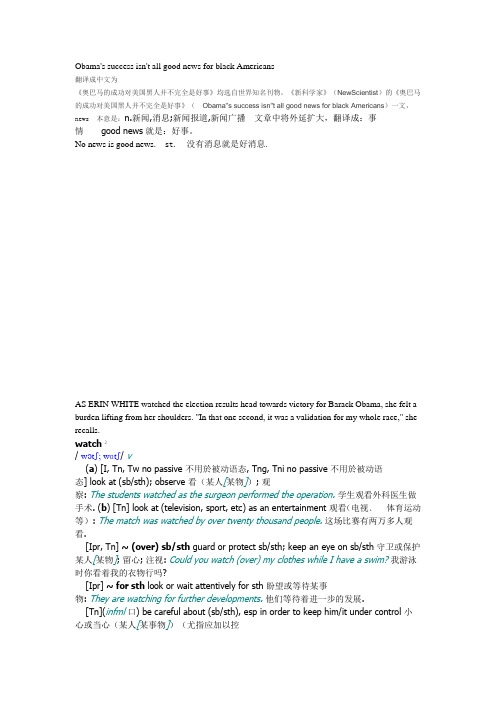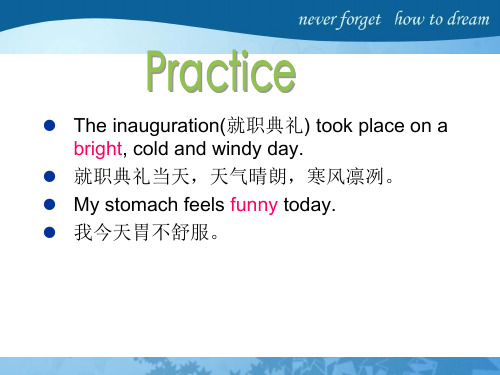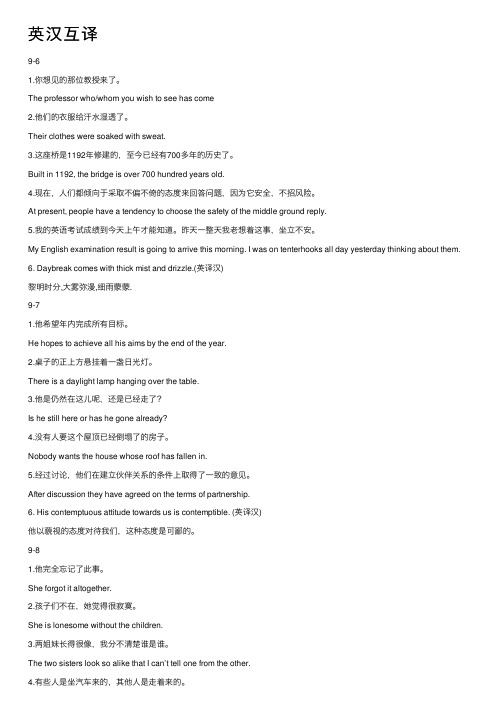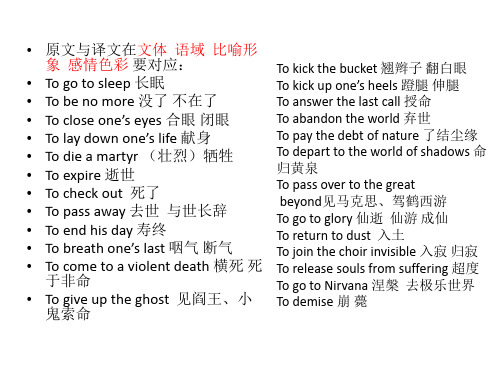英汉动词互译
英汉互译

Obama's success isn't all good news for black Americans翻译成中文为《奥巴马的成功对美国黑人并不完全是好事》均选自世界知名刊物,《新科学家》(NewScientist)的《奥巴马的成功对美国黑人并不完全是好事》(Obama"s success isn"t all good news for black Americans)一文,news 本意是:n.新闻,消息;新闻报道,新闻广播文章中将外延扩大,翻译成:事情good news 就是:好事。
No news is good news. st. 没有消息就是好消息.AS ERIN WHITE watched the election results head towards victory for Barack Obama, she felt a burden lifting from her shoulders. "In that one second, it was a validation for my whole race," she recalls.watch2/ wɔtʃ; wɑtʃ/ v(a) [I, Tn, Tw no passive 不用於被动语态, Tng, Tni no passive 不用於被动语态] look at (sb/sth); observe 看(某人[某物]); 观察: The students watched as the surgeon performed the operation. 学生观看外科医生做手术. (b) [Tn] look at (television, sport, etc) as an entertainment 观看(电视﹑体育运动等): The match was watched by over twenty thousand people. 这场比赛有两万多人观看.[Ipr, Tn] ~ (over) sb/sth guard or protect sb/sth; keep an eye on sb/sth 守卫或保护某人[某物]; 留心; 注视: Could you watch (over) my clothes while I have a swim? 我游泳时你看着我的衣物行吗?[Ipr] ~ for sth look or wait attentively for sth 盼望或等待某事物: They are watching for further developments. 他们等待着进一步的发展.[Tn](infml 口) be careful about (sb/sth), esp in order to keep him/it under control 小心或当心(某人[某事物])(尤指应加以控制): Watch yourself! ie Be careful what you do or say, or you will be punished. 当心你的言行! * watch every penny, ie be very careful about what one spends 花钱仔细[I, Ipr] ~ (at sth) (esp arch 尤作古语) remain awake 不睡: watch all night at the bedside of a sick child守在患儿床边彻夜不眠.W atch:外延缩小,添加限定语:在电视中。
实用英汉互译教程4 Basic Translation Skill Conversion

2. 介词转译成动词(prep.---v.)
英语中介词的使用频率相对于汉语来说要高得多 。实际上英语中很多介词在语境中可带有明显的 动作意味,例如“across, against, past, toward, through, with”等。因此在翻译的过程中为了汉语 表达的通顺流畅,可以根据具体情况将一些介词 转译为动词。
4. 副词转译为动词(adv.---v.) 英语中,副词常常用来修饰动词作状语,这样使 得副词具有了动作意味。所以,副词也可以转换 为汉语的动词来翻译。 We started home. 我们启程踏上归途。 The train will be in in ten minutes. 火车十分钟后会到达。
2. 介词转译成动词(prep.---v.)
“Coming!” Away she skimmed over the lawn, up the path, up the steps, across the verandah(凉台), and into the porch(门廊).
“来啦!”她转身蹦跳着越过草地,跑上小径,跨 上台阶,house with the money. 他用那笔钱买了一栋房子。 Both the police and the murderer are after him. 警察和凶手都在找他。 He was finally on his feet again. 他终于又站了起来。 Are you for or against the proposal? 你赞成还是反对这项提案?
be flooded with people 战争前夕,这个火车站被逃难者所淹没。 Before the war, the train state was flooded with refugees. be all packed 体育馆被塞得满满当当。 The stadium was packed with so many people. The stadium is all packed.
英汉互译——精选推荐

英汉互译9-61.你想见的那位教授来了。
The professor who/whom you wish to see has come2.他们的⾐服给汗⽔湿透了。
Their clothes were soaked with sweat.3.这座桥是1192年修建的,⾄今已经有700多年的历史了。
Built in 1192, the bridge is over 700 hundred years old.4.现在,⼈们都倾向于采取不偏不倚的态度来回答问题,因为它安全,不招风险。
At present, people have a tendency to choose the safety of the middle ground reply.5.我的英语考试成绩到今天上午才能知道。
昨天⼀整天我⽼想着这事,坐⽴不安。
My English examination result is going to arrive this morning. I was on tenterhooks all day yesterday thinking about them.6. Daybreak comes with thick mist and drizzle.(英译汉)黎明时分,⼤雾弥漫,细⾬蒙蒙.9-71.他希望年内完成所有⽬标。
He hopes to achieve all his aims by the end of the year.2.桌⼦的正上⽅悬挂着⼀盏⽇光灯。
There is a daylight lamp hanging over the table.3.他是仍然在这⼉呢,还是已经⾛了?Is he still here or has he gone already?4.没有⼈要这个屋顶已经倒塌了的房⼦。
Nobody wants the house whose roof has fallen in.5.经过讨论,他们在建⽴伙伴关系的条件上取得了⼀致的意见。
汉译英时有关动词的翻译(1)

The officer put down his cap and stood up.
Putting down his cap, the officer stood up.
有些连动式,前一个动作表示后一个动作的方 式、状态,在翻译时,通常把后一个动词译成 英语的谓语,而用分词或介词短语译出前一个 动作。如:
四、兼语式谓语的泽法
汉语兼语式的特点是:谓语有两个动词,前动词的宾语,又是后一动词的 主语,前后两个动词不共一个主语。如:
老板叫我到办公室去。 在这句话里,“我”是“叫”的宾语,又是“到办公室去”的主语。“我”
一身兼两职,这就叫做“兼语”,这种句子就称为兼语式。其基本译法有 以下几种: 根据英语句型:主语十谓语十宾语十宾语补足语,把兼语式的第二个动词 转化为英语的宾语补足语,可以由不定式、介词、形容词、分词或名词来 充当。如: 1)医生劝他戒烟。 The doctor advised him to give up smoking. 2)他们组织工人加入了工会。 They have organized the workers into trade unions. 3)我们必须使教室保持整洁。 We must keep the classroom clean and tidy. 4)他听见有人轻轻叩门。 He heard someone knocking lightly on the door. 5)我们选举他为公司的经理。 We elected him manager of the company.
He dashed into the meeting room and shouted at the top of his voice.
英汉互译

(2)词义范围大小和侧重不同
• • • • • • • 国家: country ; nation; land; state; power state 指国家的政治实体 表示国家的地理范畴。 country 给人以国土或家园之感。 land 表示国家的实力 power 体现在共同的地域和政府下的全民概念 nation
一词多义—歧义
• She listened with interest to the conversation going on about her. • She listened with interest to the conversation going on about her. • about =concerning关于; =around周围
a
. but
He all but did these experiments.
他几乎做完了这些试验。
The machine tool is anything but old.
这台机床一点儿也不旧。
I never see you but I think of my brother.
我没有一次见到你不想起我的兄弟来。
I cannot but laugh to hear such a story.
听到这样的故事,我禁不住发笑。
What I need is nothing but a good rest.
我只需要好好休息一下。
But for the rain, we would go jogging.
要不是下雨,我们就去跑步了
同义词的差异
• • • • 1、来源不同,因而文体特点不同 2、词义轻重不同 3、词义范围、大小、侧重不同 4、形容对象和强调的内容不同
英汉互译第四讲

EXE: 切割金属时,可以看到光亮的表面,但是立刻 就变成了灰色。 When metals are cut, the shining surface is visible, but it turns grey almost immediately.
获悉贵国遭受地震,我们极为关切。 We are deeply concerned at the news that your country has been struck by an earthquake. 委员会怀疑他的资格。 The committee was doubtful of his qualification. 我们绝不满足于现有的成就。 We are not content with our present achievements. 我们相信,在两市的共同努力下,我们两市的合作必定 进一步发展。 We are convinced that with the joint efforts of our two cities, the friendly relation and cooperation between us will develop further.
11他们在工作中非常注 意理论联系实际。 12 徐悲鸿画马,画得特 别好。
12 In their work, they pay much attention to the combination of theory with practice. 13 Xu Beihong’s drawing of horses are exceptionally good.
2 汉语动词转化为英语形容词: 汉语中一些表示知觉、情感等心理状态的动词, 往往可以转换成英语形容词,通常多以“Be+ 形容词….”结构来表达。
常用英汉互译技巧

八、插入法 指把难以处理的句子成分用破折号、括号或前后逗号插入译句 中。这种方法主要用于笔译中。偶尔也用于口译中,即用同位 语、插入语或定语从句来处理一些解释性成分。
如:如果说宣布收回香港就会像夫人说的“带来灾难性的影 响”,那我们将勇敢地面对这个灾难,做出决策。 If the announcement of the recovery of Hong Kong would bring about, as Madam put it, “disastrous effects,” we will face that disaster squarely and make a new policy decision.
常用英汉互译技巧
五、正译法和反译法
这两种方法通常用于汉译英,偶尔也用于英译汉。所谓正译,是指把句子 按照与汉语相同的语序或表达方式译成英语。所谓反译则是指把句子按照 与汉语相反的语序或表达方式译成英语。正译与反译常常具有同义的效果, 但反译往往更符合英语的思维方式和表达习惯。因此比较地道 。
例1. 你可以从因特网上获得这一信息。 You can obtain this information on the Internet. (正译) This information is accessible/available on the Internet. (反译) 例2. 他突然想到了一个新主意。 Suddenly he had a new idea. (正译) He suddenly thought out a new idea. (正译) A new idea suddenly occurred to/struck him. (反译)
常用英汉互译技巧
三、转换法 例1. Too much exposure to TV programs will do great harm to the eyesight of children. 孩子们看电视过多会大大地损坏视力。(名词转动词) 例2. 由于我们实行了改革开放政策,我国的综合国力有了明显 的增强。 Thanks to the introduction of our reform and opening policy, our comprehensive national strength has greatly improved. (动 词转名词) 例3. 时间不早了,我们回去吧! We don’t have much time left. Let’s go back. (句型转换)
英汉互译

动词短语顺序:(逻辑主语)+(状语)+ 动词 +(宾语)+(宾语补足语)+(状语)注:单词作状语一般前置,短语作状语一般后置。
动词是不定式就叫不定式短语;如果是-ing 形式,则作名词用时叫动名词短语,作形容词和副词用时叫现在分词短语。
e.g.1接受中国留学生to accept Chinese students2发展国与国之间的关系to develop state–to–state relations3盲目照搬to blindly copy4让人们理解(for)people to understand动词短语的翻译方法:先译出中心词,然后把宾语加在后面,状语译出加在后面。
e.g.仅有状语1被妥善处理to be handled properly2稳定增长to grow steadilye.g.带有宾语考虑二点:1英语的动词应当是及物动词或者相当于及物动词(不及物动词 + 介词)2宾语里面含有动词,一定译为动名词(或不定式)e.g.1历经风雨沧桑to experience all kinds of weathers, to go through twists and turns2解决台湾问题to solve the Taiwan issue3.扩大美国对华出口to expand America’s export to Chinae.g. 带有宾语和状语状语一般放在宾语后。
动词→宾语→状语1在一些领域奉行不同的政策to pursue different policies in some areas2为亚洲经济复苏做出了贡献to have made contribution to Asia’s economic recovery动词短语转换为名词短语如果动词短语包含主语,则1变为不定式时这个主语由for引导出来。
e.g.江主席访美for President Jiang to visit the United States2变为动名词时主语用名词所有格。
- 1、下载文档前请自行甄别文档内容的完整性,平台不提供额外的编辑、内容补充、找答案等附加服务。
- 2、"仅部分预览"的文档,不可在线预览部分如存在完整性等问题,可反馈申请退款(可完整预览的文档不适用该条件!)。
- 3、如文档侵犯您的权益,请联系客服反馈,我们会尽快为您处理(人工客服工作时间:9:00-18:30)。
几种特殊结构转换为汉语动词
上述译例中,英汉名词与动词相互转换,主 要是为了行文流畅,意思清楚,符合译 语习惯。 但如下两种情况必须做转换翻译处理: a. 由及物动词转化而来的名词+of+名词 汉语动宾短语 如:at the sight of money:见到钱
Disease is often an accompaniment of famine. 疾病常随饥馑而来。 Their first sight of land came after seven days at sea. 他们在海上航行七天之后才第一次见到陆地。
一.词类转换(conversion)
1. 英语名词转换为汉语动词
英语中由动词派生的或具有动作意义的名词可转译为汉语中相对应 的动词。同样,汉语中的某些动词也往往可转译为英语中的相 对应的名词。 (1) His insistence on his innocence arouses some reporters’ attention. 他坚持说自己无罪,这引起了一些记者的注意。 (2) She has a firm conviction that she will overcome all the difficulties. 她坚信她会克服所有的困难。
(3)She flared up at the sight of her husband walking with another woman. 她一看见自己的丈夫和另一个女人在一起行走就勃然 大怒。 (4)There is a steady increase in population. 人口在不断地增加。(注意:由于名词increase译成了 汉语动词,故修饰名词increase的形容词steady就相 应地译成了汉语副词)
b. 物主代词(或名词所有格)+含动作意义或由动词转化 而来的名词,也可转换成汉语动词
如:parents’ love of children 译为 父母爱护子女 父母爱护子女无微不至。 Parents’ love of children is perfect and minute. At the start of his imprisonment he was just 20 years old. 他刚入狱时年仅20岁。 His involvement of others was inexcusable. 他连累别人是不可原谅的。
He impressed me as a man of great ability. 他给我的印象是他相当有能力。 The camel is characterized by the ability to go for long periods without water. 骆驼的特点是能够长期行走而不喝水。
Chapter 3 Different Ways of Expressing Actions
动作的不同表达方式及翻译
由于英汉两种语言在遣词造句和表达习惯等方面的 差异,在动词的运用上部有各自的特点:英语动词 很少,一个句子通常只能有一个谓语动词;汉语动 词在句中比较灵活,一个句子可以有联动式、兼动 式等几个动词连用。因此,两种语言的动词在互译 时往往发生转换、增减、重复等不同的情况。 本章讨论英汉动词互译的不同情况,至于相同情况 如原文是动词,译文也用动词(P69)不做赘述, 重点是说明不一致的地方。
c.英语表示行动者的名词如teacher, singer等有时在句
中并不表示身份、职业等,而是含有较强的动作意味,汉 译时,如果找不到恰当的对应名词,往往可译成动词(p88)
Talking with his son,the old man was the forgiver of the young man’s past wrong doings. 和儿子谈话时,老人宽恕了这位年轻人过去所干的 坏事。 The little girl was a poor sleeper,and Mr. Forer was in the habit of singing to her as he rocked her at bedtime. 这个小女孩睡不好觉,福勒先生习惯于在就寝的 时候,一边摇她,一边给她唱歌。
Exercises
I’m very grateful for the help you have given me. He was doubtful of the patient’s recovery. Smith was a bewildered man at the moment He is out of employment,so any work will be welcome to him.
汉语和英语相反,名词在句词。如:
百姓们就在宫门外欢呼、议论。声音正好象浙水 的涛声一样。 At the palace gates,the acclamations and comments of the people sounded like the roar of the waves of the River Cheh. 要成功地禁止使用核武器.必须首先销毁核武器。 A successful ban of the use of nuclear weapons must be preceded by the destruction of nuclear weapons.
2. 英语动词转换为汉语名词
英语中有些动词的概念在汉语中很难找到对应的词,于是 转化为汉语名词。(p84)
Round-the-clock service features this store. 日夜服务是这家商店的特色。 What motivate you to do such a thing? 引起你做这样的事的动机是什么?
3.英语形容词与汉语动词相互转译(p103)
英语句子中用作表语的形容词属于动态形容词,常常表 示知觉、情欲、愿望等心理状态,往往可以同表示知觉、 情感等心理活动的汉语动词相互转译。 He was jealous of his friend’s reputation. 他嫉妒他的朋友的名声。 She closed the door very quietly, as she was afraid of wakening the sleeper. 她一声不响地把门关上,生怕吵醒那个睡觉的人。
当局对危险警惕起来。 The authorities were alerted to the danger. 她甘愿留在家里。 She is content to stay at home. 医生们说他们不敢肯定是否救得了她的命。 Doctors said that they were not sure whether they could save her life.
Exercise:
1.This building is an example of early Chinese architecture. 2.At the mention of money, the stranger became attentive. 3.He is a good listener and everybody loved to talk with him. 4.The sight and the sound of jet planes filled me with longing. 5. Let me be your banker. 6.我班的同学中有些人唱歌唱得很好。 7.电影明星是大部分少女崇拜的对象。 1.这座建筑物代表着中国早期的建筑式样。 2.一提到钱,那陌生人就全神贯注起来。 3.他善于倾听别人的意见,所以大家都爱跟他谈心。 4.看到我们的喷气式飞机,听到隆隆的机声,我感到心驰神往。 5.你需要钱,我可以借给你。 6.Some of my classmates are good singers. 7.Film stars are objects of admiration for most girls.
我非常感激你给予我的帮助。 他怀疑病人能否痊愈。 当时史密斯迷惑不解。 他失业了,所以任何工作他都愿接受。
